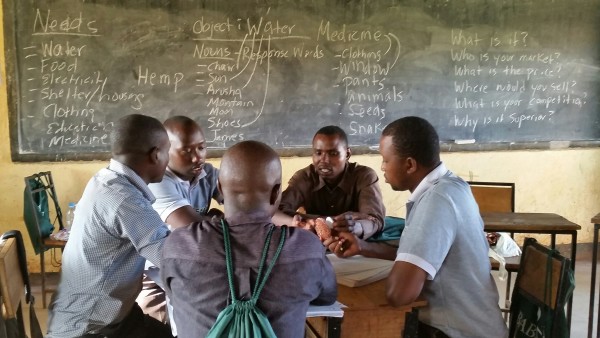Amplifying Entrepreneurial Education in Tanzania
By Sarah Schwartz, Manager of Operations for Youth Programs.
It’s morning in Karatu, Tanzania, and the sound of rhythmic clapping hands is echoing against the walls in Michela’s Room at the Ganako School. A hundred students, sitting on long wooden benches, have gathered for the final day of Babson’s Entrepreneurial Leadership Academy (BELA). Instruction begins, students’ hands fly into the air, and confident voices share their final thoughts on entrepreneurial thinking and leadership. It’s amazing that these are the same shy faces who, at the beginning of the week, were nervous to make eye contact. Yet, now, they are happy to volunteer to present their venture ideas.

Educators participating in January’s BELA Tanzania.
As part of Babson’s mission to educate entrepreneurial leaders, in addition to working with over a hundred Tanzanian high school students, the January 2016 BELA program included a cohort of Tanzanian teachers for the first time. These 16 teachers, representing local Karatu schools, transformed into “teacherpreneurs” with the ability to return to their classrooms and help students identify and nurture their new found skills and talents. Educators learned strategies to engage students in such activities as idea generation, and were able to witness the dynamic difference of project-based learning over more traditional lecturing methods. We continue to expand our footprint in Tanzania, and are working to cultivate an entrepreneurship lab in Karatu, staffed full-time by two Babson graduates, to foster Entrepreneurial Thought & Action® in the region.
In 2015, the United Republic of Tanzania abolished secondary school fees, and there has been a focus on integrating entrepreneurship into the national curriculum as a means of generating job creators. Babson’s BELA program gives students the strategic tools to think creatively and ambitiously, as well as the confidence to create their own opportunities, impacting the local economy for the next generation. One of the biggest desires we saw on the part of Tanzanian students was their commitment to give back to their communities. With what they have learned and their enthusiasm to work through problems to find opportunities for themselves, there is no doubt that wonderful things will be happening in their communities.
